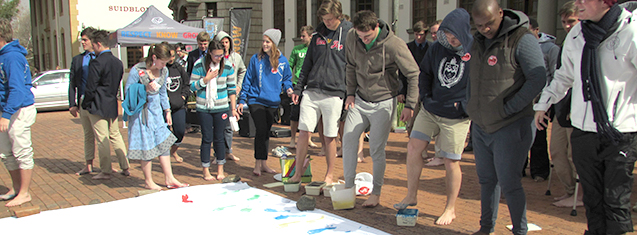
On a cloudy day when it seemed that no one would be willing to take off their shoes, Armentum men’s residence and Put Foot Foundation supporters stepped out in their numbers to provide shoes for less fortunate school children.
With a R10 donation, supporters could dip their feet in paint in order to make their mark on the blank canvas in support of this good cause. The main aim of barefoot day is to tackle the daily plight and indignity of school children.
The Armentum students kicked off the event on the Red Square at the UFS Bloemfontein Campus, where they were partnered by the Institute for Reconciliation and Social Justice.
On the day, Dr Choice Mokgetha, Vice-Rector: External Relations, and Prof Nicky Morgan, Vice-Rector: Operations, made a contribution of R1000 for all the foot prints made on the canvas.
“The idea was conceived by the residence and RC Culture, Thapelo Makhubalo. Joining hands with the Institute for Reconciliation and Social Justice made it possible for us to make it an even bigger event. “Since I work at the Institute, and they work with human rights, it was easier to get them on board,” said the Prime of Armentum, Eddie de Wet.
At the end of the event, the blank canvas was filled with footprints supporting the initiative. All proceeds will be used to put shoes on the feet of children.